13 Most Durable Best Kitchen Countertop Materials for Your Home
Discover the best kitchen countertop materials, from sturdy granite to modern vitrified slabs, that can be ideal for your households. As an added bonus, you can find helpful hints for maintaining your new countertop so it looks excellent and lasts a long time. Be ready to transform your space with MyTyles' premium countertop solutions.
By Eesha

Wed , Feb 19 , 2025

5 min read
People often assert that the kitchen embodies the soul of a house. At the center of this vital space lies a critical element, which is the countertop. A countertop is not just used for chopping vegetables or placing hot pans; it acts as a defining feature of the overall design. Therefore, by selecting the appropriate kitchen countertop material, you can significantly impact the appearance of your kitchen over time.
However, there are many materials available for countertops, each offering unique advantages. There is timeless granite, modern engineered quartz, vitrified slabs and many more. These options can cater to varying needs and preferences. For Indian households, factors like heat resistance, stain tolerance, and the ability to withstand heavy use often take precedence.
At MyTyles, we understand how important it is to strike a balance between usefulness and design. That is why we have curated a selection of countertop materials, ranging from affordable options to high-end finishes, that can work well in different settings.
The 13 Best Kitchen Countertop Materials
Each type of countertop can bring its own set of strengths, weaknesses, and unique appeal. Here we can look into the 13 most popular options to decide which one suits your kitchen best.
1. Granite
Granite can be the best material for kitchen countertops in India. It is a natural stone that is admired for its durability and elegance. It can withstand heavy usage and high temperatures, making it a favorite choice for Indian kitchens. Therefore, it is an ideal choice for everyday cooking. Each granite slab is unique, offering a unique appearance. It can be an excellent choice for a luxurious, natural stone that can handle rigorous use.
Pros:
- It is highly durable and resistant to heat, scratches, and chips.
- There is a wide variety of colors and patterns, giving it a unique look.
- It adds value to your home with its premium appeal.
Cons:
- The material is porous and requires regular sealing to prevent stains.
- Rare patterns can be expensive.
- The material is heavy and requires professional installation.
Below you observe a granite countertop kitchen with matching geometric backsplashes and wooden cabinets.
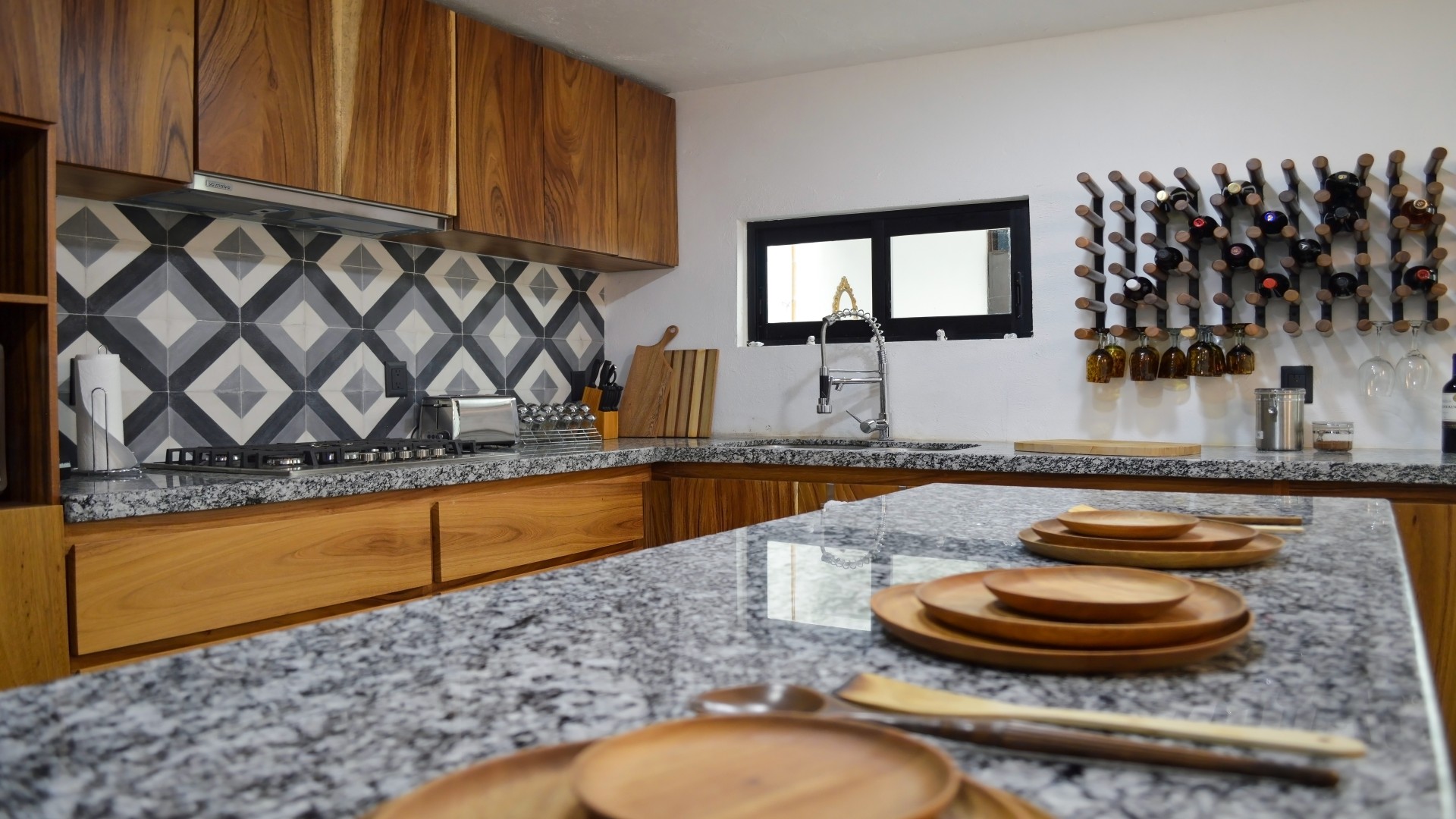
2. Quartz or Engineered Stone
Natural quartz crystals and plastic resins can engineer quartz countertops to create a non-porous, durable, and low-maintenance surface. Their consistent patterns and modern aesthetic can make them a popular choice for contemporary kitchens. Quartz can be perfect for those who want a durable, low-maintenance countertop with a uniform look
Pros:
- Non-porous surfaces resist stains, bacteria, and scratches.
- The product is low maintenance, as no sealing is required.
- They are available in a wide range of colors and patterns.
Cons:
- Prone to heat damage if exposed to hot cookware directly.
- They are generally more expensive than certain natural stones.
- The lack of natural variation in materials such as granite or marble is evident.
In the image below, you can look at a quartz countertop in the kitchen with minimal decor.
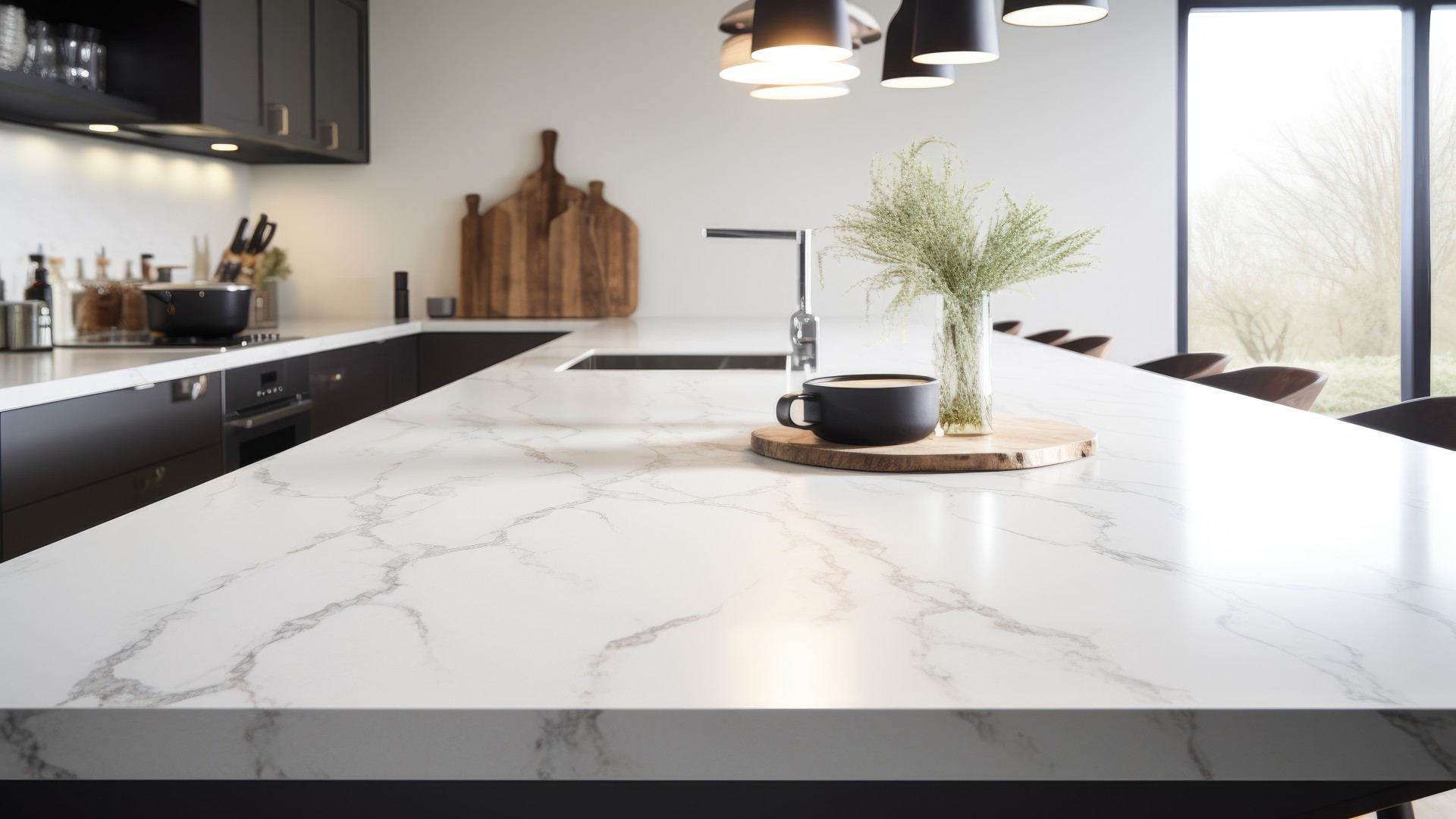
3. Marble
Marble is synonymous with luxury and sophistication. It is one of the classic choices of kitchen countertop options. High-end kitchens often use it due to its unique veining and natural elegance. However, its softness makes it better suited for kitchens where visual appeal takes precedence over heavy use. It can demand diligent care and immediate cleanup of spills to preserve its pristine look.
Pros:
- The design boasts a luxurious, timeless look with unique veining.
- Naturally cool surface, ideal for baking and pastry preparation.
- The material is resistant to heat under normal conditions.
Cons:
- Prone to scratches, etching, and staining.
- It requires frequent sealing to maintain its appearance.
- The product is more expensive compared to other materials.
In the image below, you can observe a white marble countertop in the kitchen
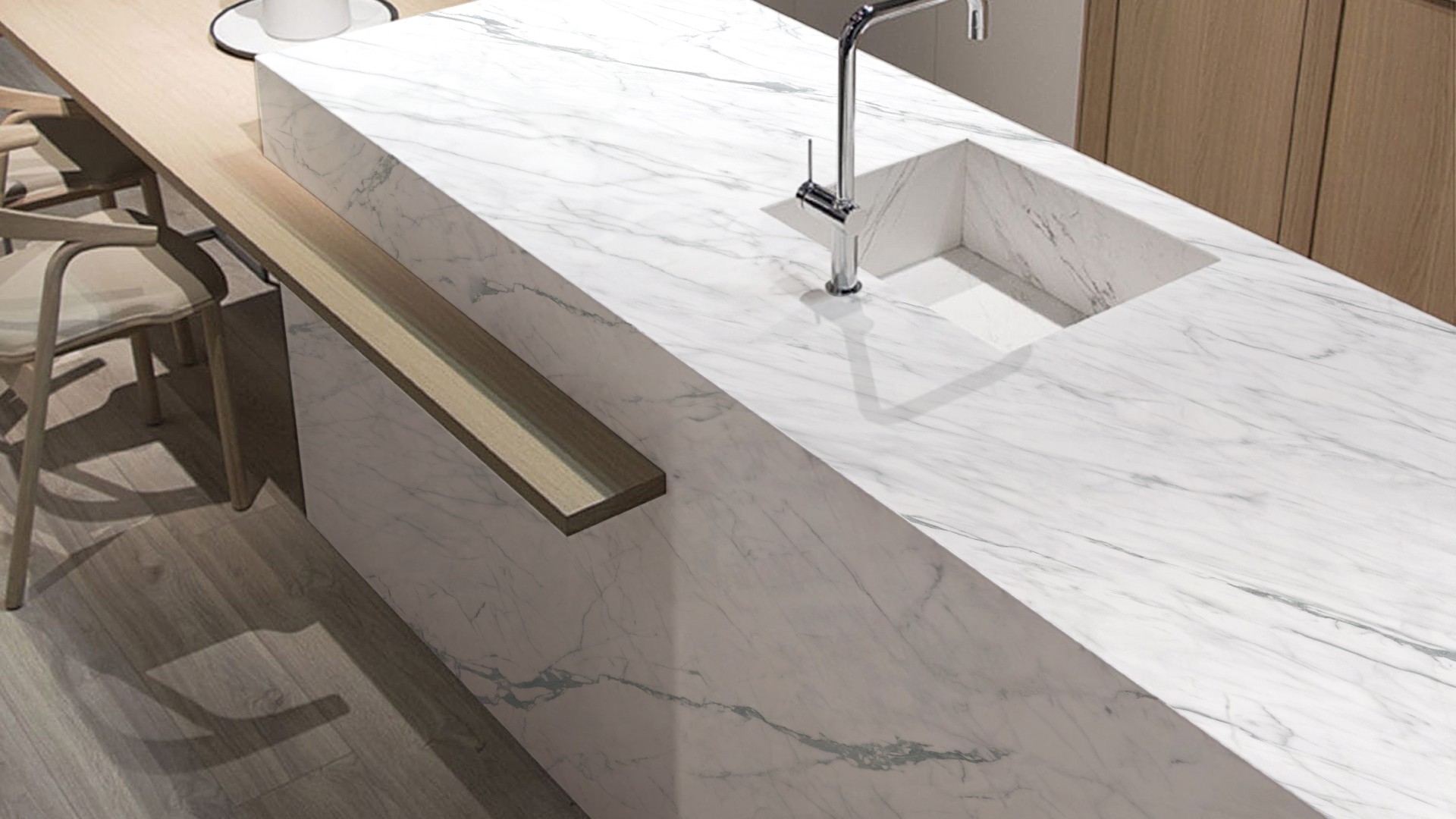
4. Vitrified Slabs
Vitrified slabs are a modern and practical choice for kitchens. They can offer the perfect balance of durability, style, and low maintenance. These slabs mimic the appearance of natural stone and are ideal for households looking for an affordable yet stylish option. Vitrified slabs can be a smart investment.
Pros:
- They are non-porous, making them resistant to stains and scratches.
- The product is heat-resistant and simple to clean.
- They are available in a wide range of designs and finishes.
Cons:
- It requires professional installation due to its weight and precision.
- Compared to natural stone, this material's customization options are more limited.
You can observe in the image below of a vitrified slab mimicking marble, placed on the kitchen countertop with matching floor tiles.
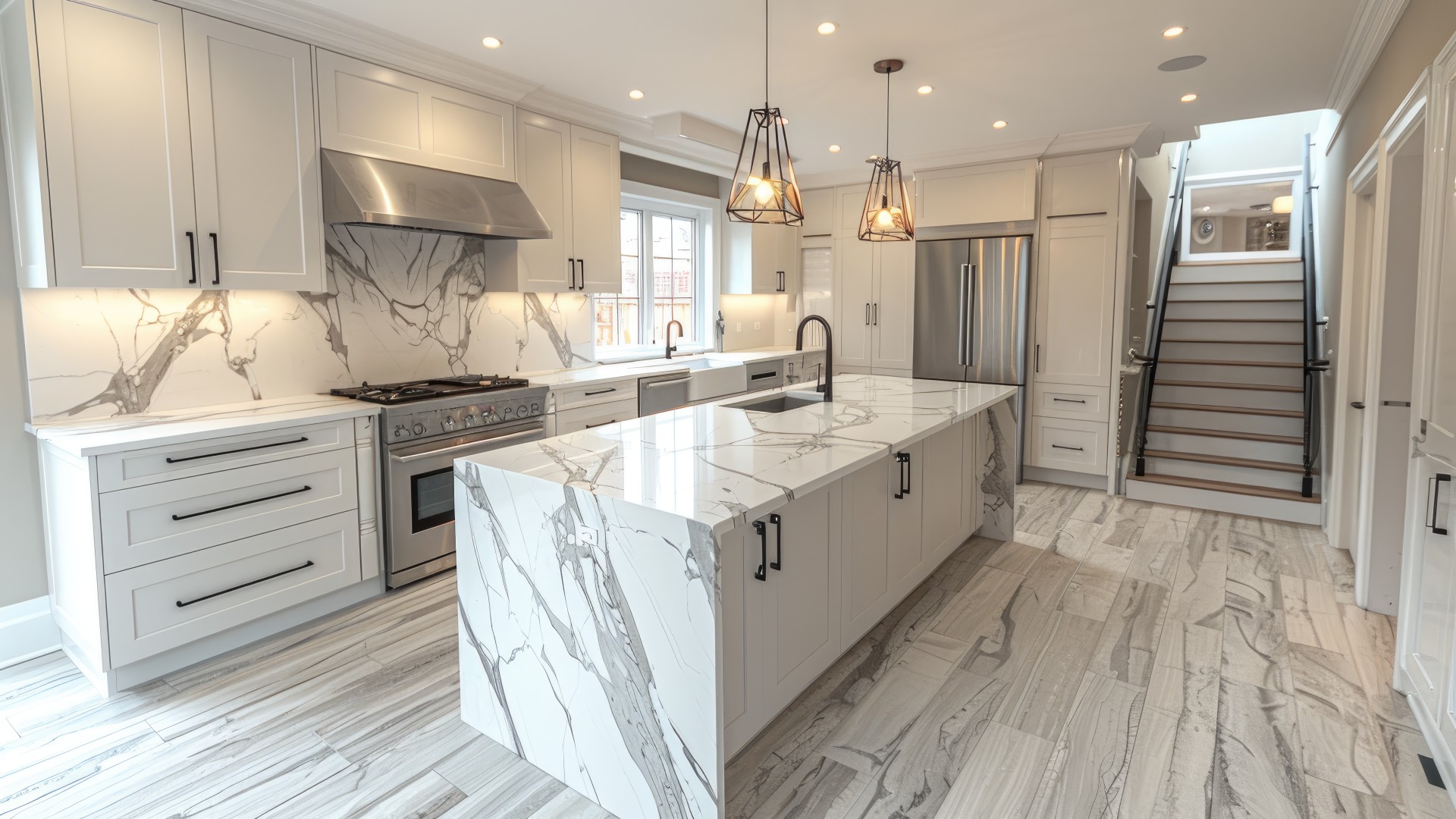
5. Solid Surface or Corian
People favor solid surface countertops, also known as Corian, for their smooth appearance. They can have integrated sinks and backsplashes along with countertops. This can help create a clean aesthetic. Solid surface countertops are made with synthetic materials. While they may not replicate the depth of natural stone, solid surface countertops can be perfect for those seeking a customizable look with minimal upkeep.
Pros:
- They give a seamless appearance with no visible joints.
- They are non-porous, easy to clean, and resistant to bacteria.
- The scratches and minor damage can be repaired by sanding.
Cons:
- They can be less heat-resistant than natural stone; hence, trivets are required.
- They can be prone to scratches and dents over time.
- They can lack the depth and natural variation of stone.
In the image below, you can observe a solid surface countertop kitchen.
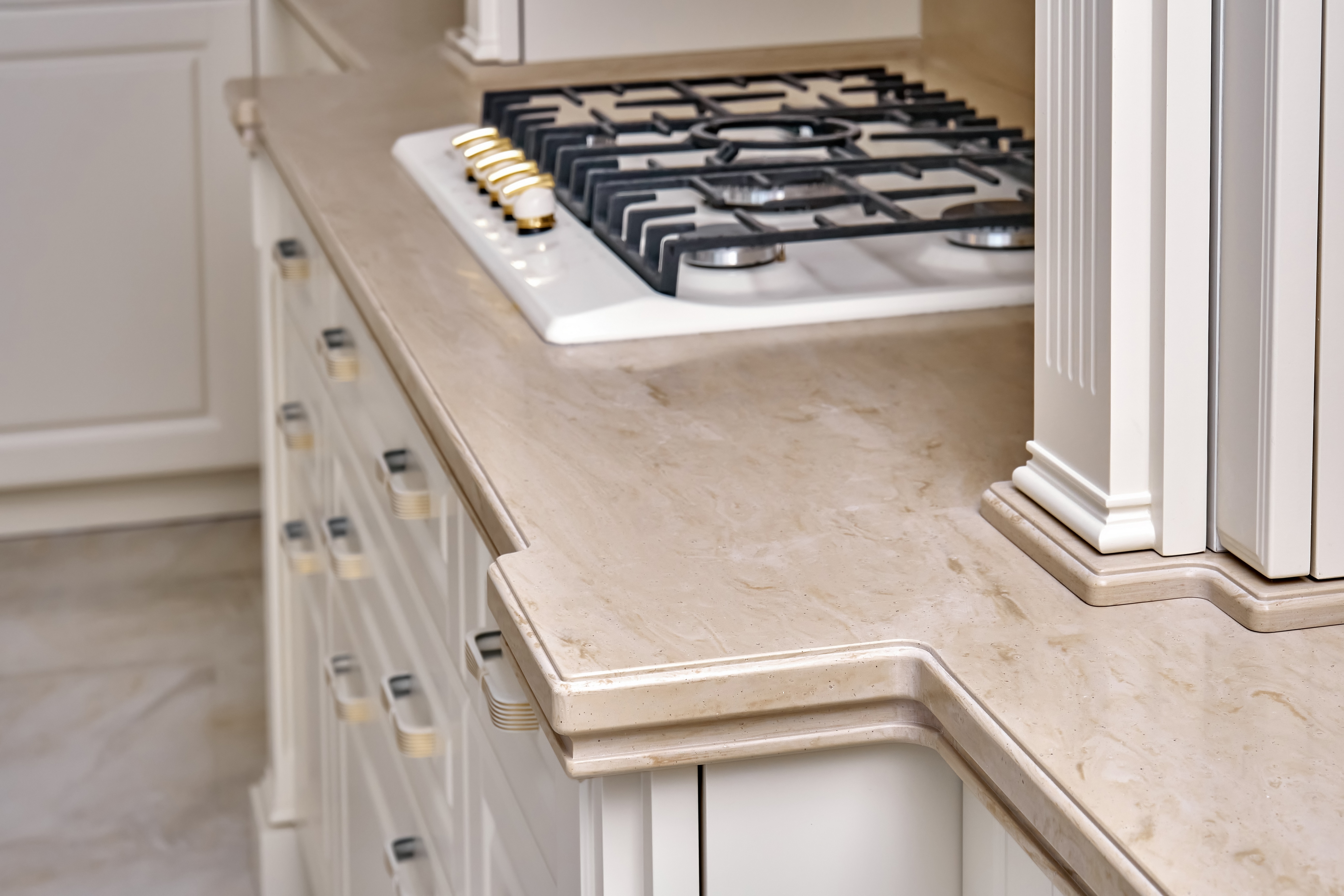
6. Nano White Crystalline Glass
Nano white crystalline glass is a man-made material with a sleek, glossy finish. It can give the kitchen a bright and ultra-modern appearance. It is known for being durable, stain-resistant, and easy to maintain. Nano white glass is best suited for homeowners looking to achieve a minimalist look with a premium feel.
Pros:
- They are non-porous and highly resistant to stains and scratches.
- The ultra-glossy finish provides a clean and contemporary aesthetic.
- They can be durable and heat-resistant under normal kitchen conditions.
Cons:
- They have limited color options, primarily available in white.
- They can be expensive compared to other countertop materials.
- They require skilled professionals for installation.
In the image below, you can observe the white nano glass countertop in the kitchen.
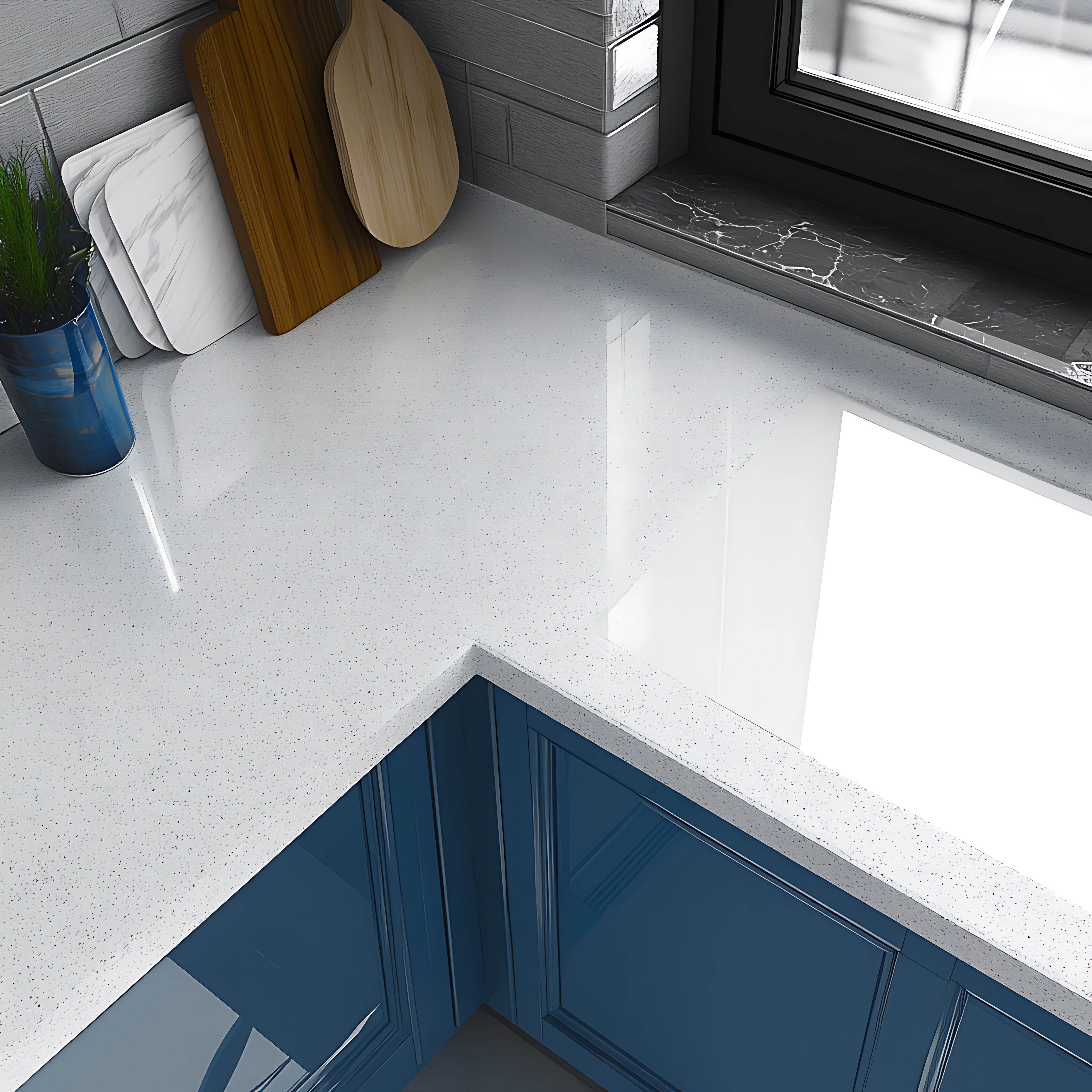
7. Stainless Steel
Stainless steel can be a practical kitchen platform material choice for high-usage kitchens. They offer industrial-grade durability and ease of cleaning. They are more popular in commercial kitchens. They also bring a modern, utilitarian style to homes. They can be a perfect fit for households that prioritize utility over design.
Pros:
- They can be highly durable and resistant to heat, stains, and bacteria.
- They are easy to clean and hygienic for food preparation.
- They complement industrial and minimalist kitchen designs.
Cons:
- They are prone to scratches, dents, and fingerprints over time.
- They can appear too cold or sterile for some design preferences.
- Their reflective surfaces may show smudges easily.
In the image below is a beautiful stainless steel kitchen countertop.
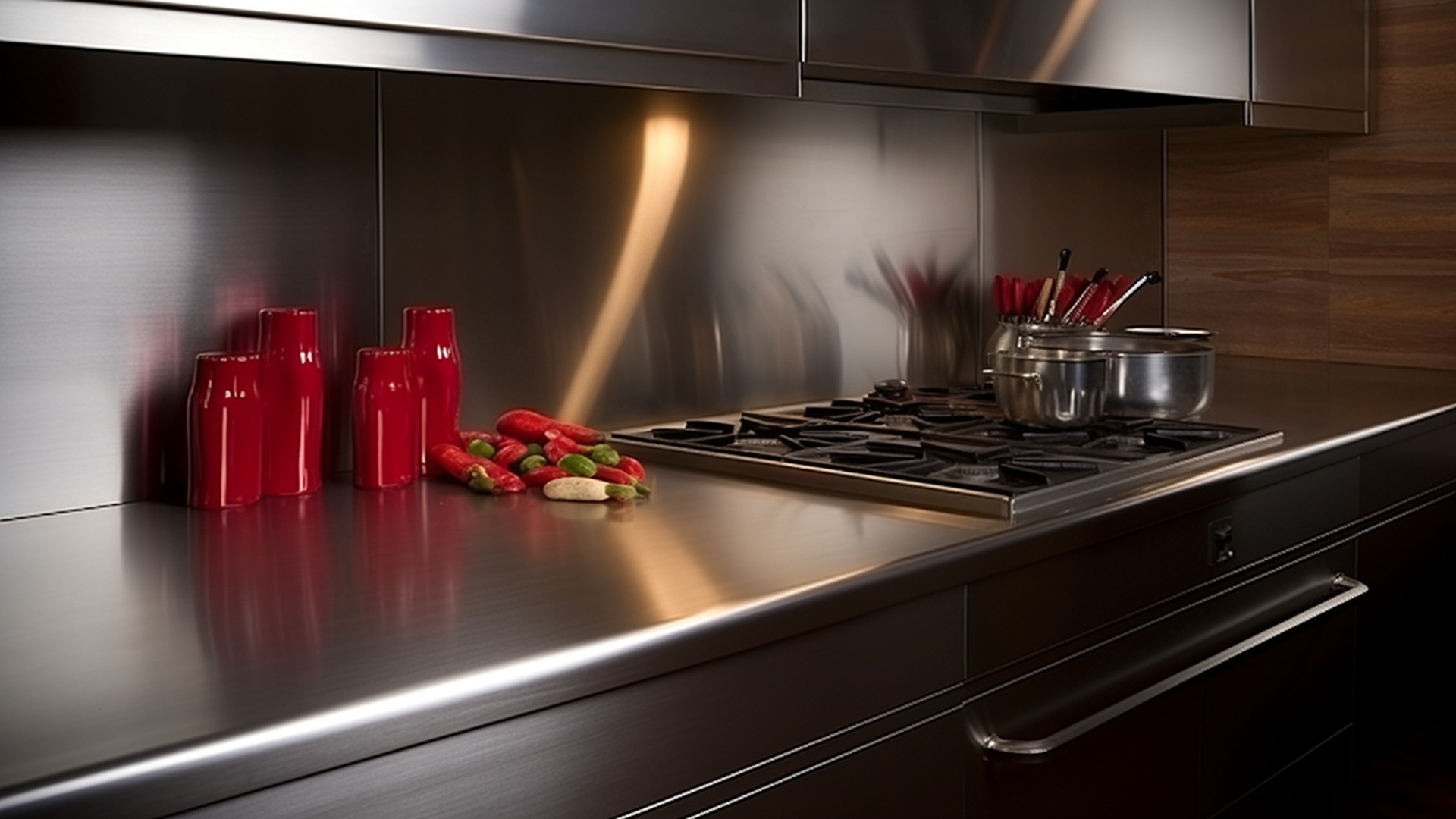
8. Concrete
Concrete countertops are a bold, modern choice that offers excellent durability and a customizable appearance. They can be heat-resistant and can be personalized with pigments or patterns to suit various styles. If you prefer a contemporary, unique look and are prepared to invest in maintenance, concrete can be an excellent choice for your kitchen.
Pros:
- They can be highly durable and resistant to heat and wear.
- They can be customized with pigments, stains, and unique textures.
- They develop a natural patina over time, adding character.
Cons:
- They can be porous material that requires regular sealing to prevent stains.
- They can develop hairline cracks over time.
- They are heavy and require professional installation.
You can see the image below of a concrete countertop in the kitchen for inspiration.
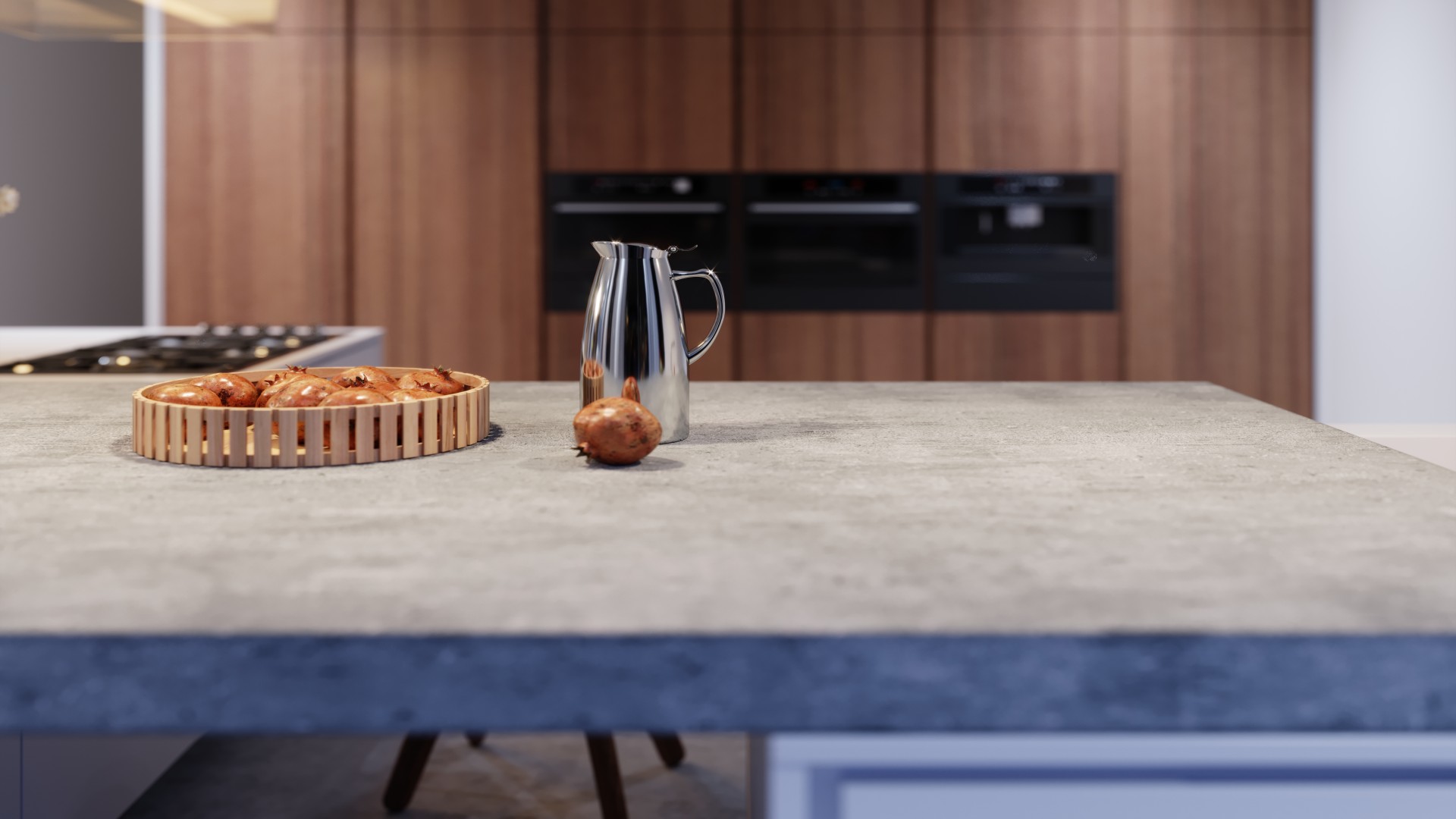
9. Wood or Butcher Block
Wood countertops, especially butcher block, are the kitchen countertop material that can add warmth and character to kitchens with their natural and rustic appeal. They are versatile and can be sanded down to remove scratches. Those who love the cozy charm of natural wood and do not mind the maintenance, butcher block countertops can be a wonderful addition
Pros:
- They add warmth and character to the kitchen.
- The surface can be refinished by sanding.
- They are ideal for food prep and cutting tasks.
Cons:
- They are prone to water damage if not sealed properly.
- They require regular oiling and maintenance.
- They are susceptible to stains, scratches, and dents.
In the image below, you can see a wooden countertop in the kitchen.
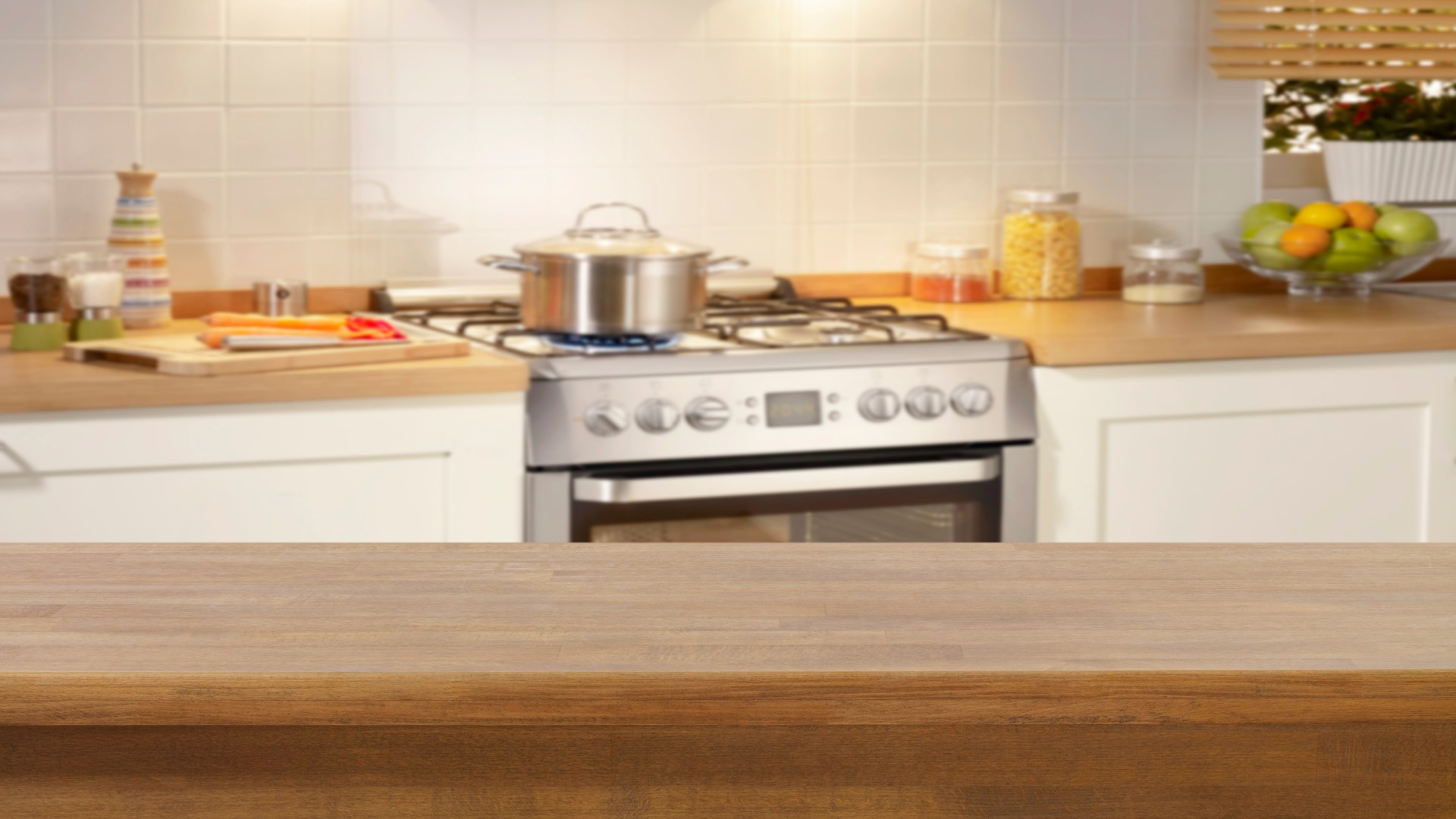
10. Laminate
Laminate countertops are a budget-friendly option available in a wide range of colors and patterns. They can mimic a stone look. They are surprisingly lightweight. They are a practical choice for cost-conscious homeowners. Although it might not be the strongest material, laminate can be a wonderful choice for kitchens that value affordability.
Pros:
- They can be affordable and widely available.
- They are lightweight and easy to install.
- They come in various designs, including options that mimic stone or wood.
Cons:
- They can be prone to scratches, heat damage, and peeling edges.
- They are less durable than natural or engineered stone.
- They may not be suitable for heavy-duty use.
In the image below, you can observe a laminate kitchen countertop.
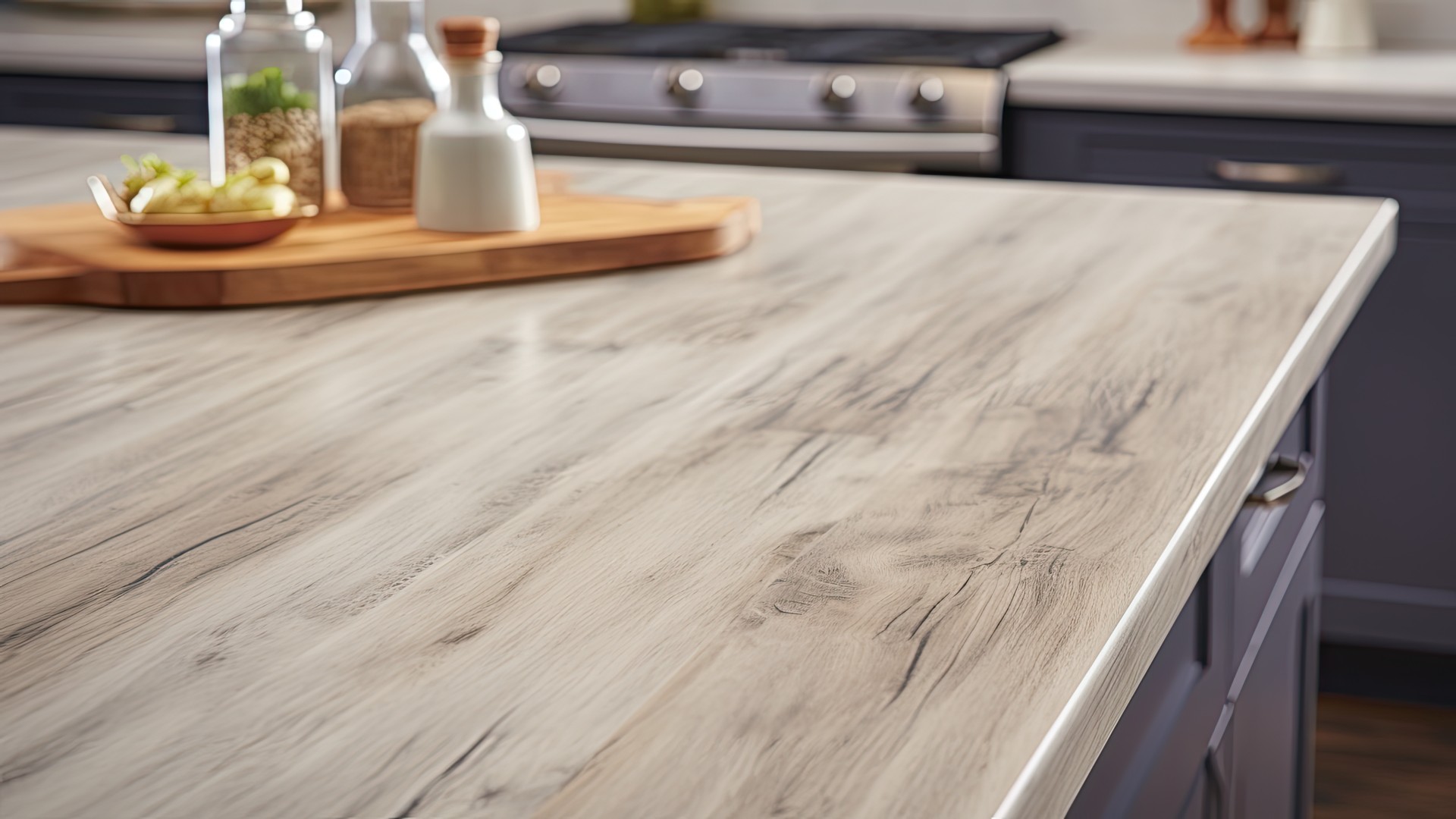
11. Ceramic Tiles
Ceramic tile countertops are one of the kitchen countertop tiles that can offer a multipurpose use with affordability. With proper care, ceramic tiles can provide a functional and visually appealing countertop solution. They are a good option for homeowners who want a unique and customizable kitchen design.
Pros:
- They are affordable and easy to replace individual tiles if damaged.
- They can be heat-resistant and durable.
- There is a wide variety of colors and designs available.
Cons:
- The grout lines can collect dirt and require regular cleaning.
- The surface may be uneven compared to slab materials.
- They are prone to chipping under heavy impact
The below image is of a ceramic tile kitchen countertop.
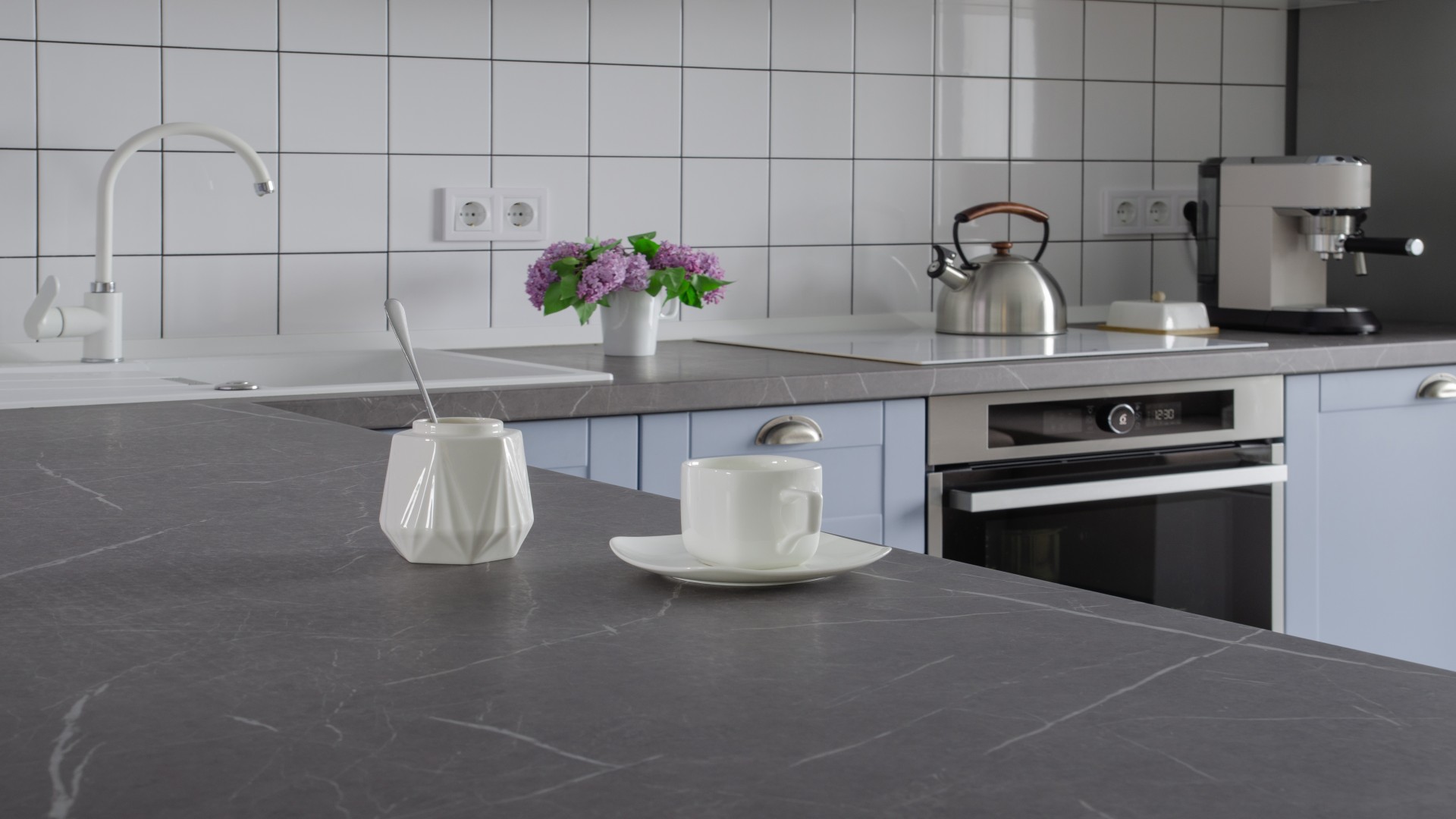
12. Soapstone
Soapstone is a natural material with a soft, matte finish that develops a unique color change over time. It can offer a rustic, farmhouse look and can be highly resistant to heat and bacteria. Those who appreciate natural materials with a familiar aesthetic and are willing to embrace its evolving character can choose soapstone.
Pros:
- They are naturally resistant to heat, stains, and bacteria.
- They develop a color change that adds character over time.
- They are easy to clean and maintain.
Cons:
- They are softer material prone to scratches and dents.
- They can have limited availability and higher costs.
- They require regular oiling to enhance their appearance.
In the image below, you can get a glimpse of a soapstone countertop in the kitchen.
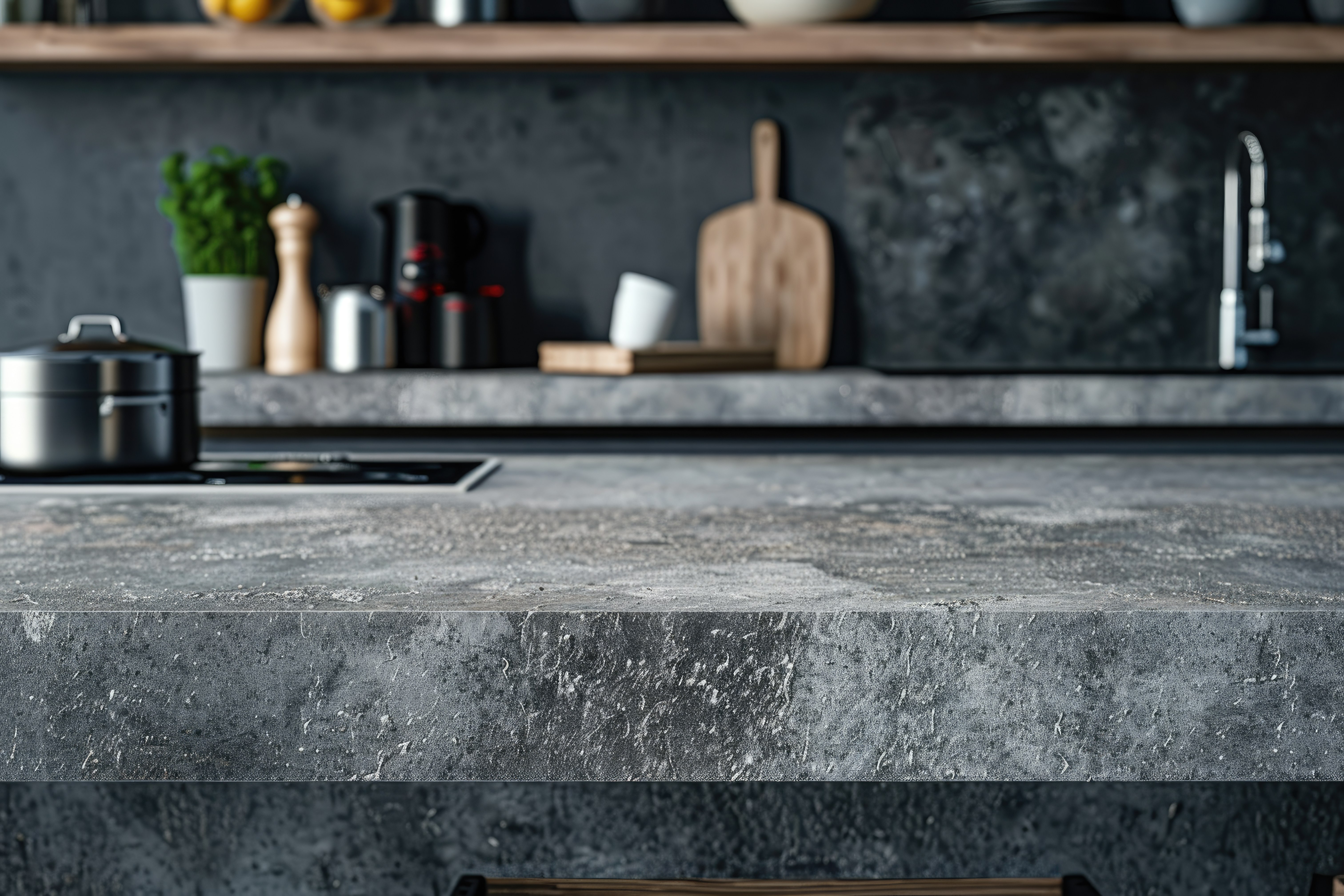
13. Terrazzo
Incorporating pieces of stone, glass, or other materials into a cement base or resin base creates terrazzo countertops. They are known for their speckled design. This kitchen countertop material can offer a unique look that complements both modern and vintage kitchens. When seeking an artistic, green alternative, terrazzo can be a unique and practical option.
Pros:
- They are eco-friendly and highly customizable.
- They are durable and resistant to stains and scratches.
- They have unique patterns that add artistic flair to kitchens.
Cons:
- They require periodic polishing to maintain their shine.
- They can be prone to cracking if not properly installed.
- They are expensive compared to more traditional options.
You can view a kitchen with a terrazzo countertop and backsplash in the picture below.
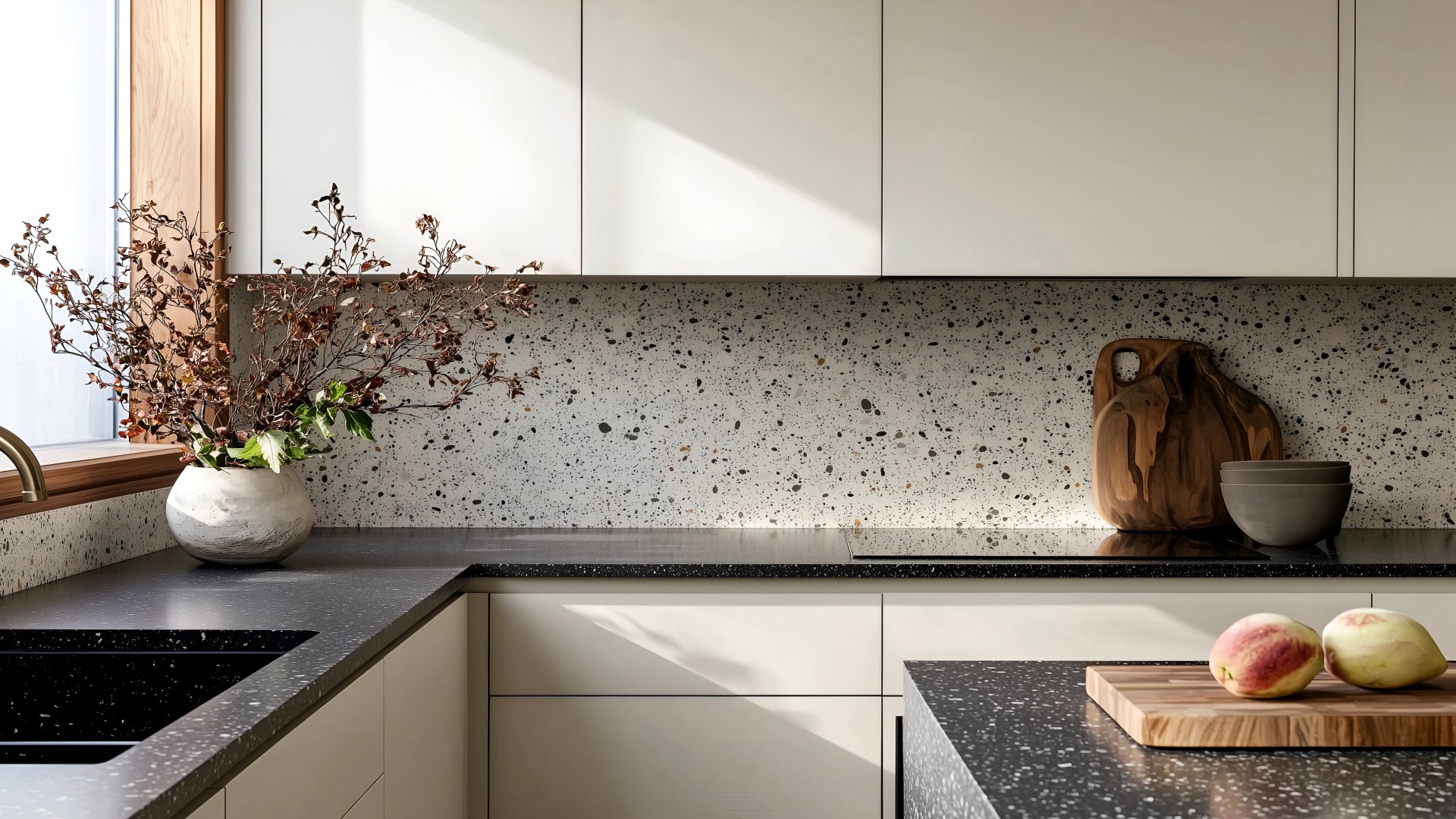
Factors to Consider for Choosing a Countertop Material
Before deciding on your kitchen countertop materials, you can think about how often you cook, how you live, and what you hope to accomplish in terms of long-term upkeep.
- Durability: Kitchens often involve rigorous use of hot cookware, sharp knives, and heavy utensils as a part of the routine. Hence, a countertop material needs to be robust enough to withstand daily wear and tear. The materials like granite and quartz are excellent options for their resilience, while softer options like marble need more care.
- Maintenance: Maintenance requirements can vary for kitchen countertops. For busy households, non-porous materials like vitrified slabs or quartz are easier to clean and less prone to staining. The porous materials can require regular sealing and care to maintain their look, like marble or wood.
- Heat and Stain Resistance: Cooking involves the use of hot pans, oil, and spices. A countertop that can handle heat without cracking and resist stains from ingredients like turmeric or oil is essential. Materials like vitrified tiles and stainless steel offer excellent resistance, while others may need extra care to avoid discoloration.
- Budget: Countertop materials like granite and vitrified slabs are popular for offering a balance of affordability and quality. On the other hand, premium materials like quartz or nanowhite glass may be more expensive but can provide a high-end look.
- Aesthetics: Your countertop plays a crucial role in defining your kitchen’s overall look. You can prefer a classic, rustic style with natural stone or a sleek, modern design with glossy vitrified tiles. Further, the material you choose can complement your cabinetry, flooring, and overall look.
Bestsellers at MyTyles for Kitchen Countertops
Here are a few bestselling vitrified slab kitchen countertops in various colours available at Mytyles:
- Vitrified Black Slab Floor and Wall Tile Code 22044 (790x3000mm, Matt): You can use this black marble-look slab tile that features a sophisticated matte finish. Combining marble’s beauty with tile durability, it can be perfect for kitchen countertops.
- Vitrified White Slab Floor and Wall Tile Code 22043 (790x3000mm, Matt): This features a sleek, matte white finish for a refined look. It can be perfect for kitchen countertops. It can blend marble look with tile durability.
- Vitrified White Slab Floor and Wall Tile Code 22032 (790x3000mm, Glossy): This high-gloss white marble-look slab tile can offer seamless luxury with minimal grout lines. They are perfect kitchen countertops.
- Vitrified Brown Slab Floor and Wall Tile Code 25874 (790x3000mm, Glossy): You can improve your interiors with this brown high-gloss natural stone-look slab tile. They can be a great match for kitchen countertops with easy maintenance.
- Vitrified Slab Tile Code 20774 (800x2400mm, Carving Matt): This green vitrified tile has a rich emerald base with delicate peachy-pink graining. It has a satin matte glaze and exceptional durability, perfect for kitchen countertops.
- Vitrified Brown Wooden Slab Floor and Wall Tile Code 22046 (790x3000mm, Matt): You can add natural warmth to your kitchen with wooden-look slab tile. This features a realistic grain design and matte finish. Perfect for countertops.
- Vitrified Grey Slab Floor and Wall Tile Code 22041 (790x3000mm, Matt): This grey marble-look slab tile features a matte finish for a refined, seamless look. They can be perfect kitchen countertops.
- Vitrified Slab Tile Code 20773 (800x2400mm, Carving Matt): This tile can mimic Arabescato stone with soft matte grays, whites, and ivories for a refined, natural look. This tile is both durable and elegant, providing upscale aesthetics for a kitchen countertop at a fraction of the cost.
- Vitrified Cream Slab Floor and Wall Tile Code 22040 (790x3000mm, Matt): This travertine-look slab tile features a refined matte finish. This can be ideal for kitchen countertops with durability and easy maintenance.
How to Maintain Kitchen Countertops for Long-Lasting Beauty
Taking proper care and maintenance can extend the lifespan of your kitchen platform materials while keeping them looking their best. To know more about cleaning kitchens, you can read the blog How to Clean Kitchen Tiles: A Comprehensive Guide.
- Regular Cleaning: Cleaning your countertops daily with a soft cloth or sponge and a mild detergent can prevent the buildup of dirt and grime. Harsh scrubbers can cause surface scratches, particularly on delicate materials such as marble or laminate. Also, spills should be wiped immediately to prevent staining, particularly on porous materials like granite and marble.
- Use Cutting Boards and Trivets: Protecting your countertop from scratches and heat damage is essential. You can always use a cutting board for chopping and slicing to avoid surface damage. You can place hot pans on trivets or heat pads to prevent burns or cracks, especially for quartz, laminate, or solid surface countertops.
- Sealing Natural Stones: The porous materials like granite, marble, and concrete can require regular sealing to protect against stains and water damage. A simple water test can help determine if resealing is necessary. For instance, if the water darkens the surface quickly, it is time to apply a new sealant.
- Avoid Harsh Chemicals: Acidic or abrasive cleaners can dull and damage the surface of countertops over time. You can instead opt for gentle, pH-neutral cleaners for materials like vitrified slabs, quartz, and ceramic tiles. This not only preserves the finish but also prevents discoloration or damage on materials like marble.
- Polishing and Repairs: You can wipe down or polish certain materials, such as solid surfaces like Corian or marble, to restore their original finish. Periodic professional polishing for marble and terrazzo can help remove scratches and maintain their glossy appearance. For minor surface damage, solid surfaces can be easily repairable.
- Prevent Water Damage: Wood or butcher block countertops can require extra care to prevent water damage. Immediately wipe up any spills. The periodic reapplication of protective oil or finishes can help maintain their durability and prevent warping, cracking, or mold growth.
- Periodic Deep Cleaning: Beyond the daily cleaning, countertops can benefit from occasional deep cleaning to tackle stubborn stains or residues. You can also use material-specific products. You can use stone cleaners for granite surfaces or stainless steel polish for metal surfaces. This can keep the countertop looking fresh and help prevent wear and tear.
Wrapping Up your Kitchen with the Right Countertop
One of the most important steps in designing a beautiful and practical kitchen is selecting the material for the countertops. As each option has unique strengths, granite offers durability, quartz requires minimal maintenance, and vitrified slabs provide practicality. Almost all households require heat resistance, stain tolerance, and durability as essential considerations. Yet, your lifestyle and budget should guide your decision.
The luxurious materials like marble can need extra care, while affordable options like laminate or ceramic tiles offer excellent value. You can explore MyTyles for a range of premium materials like vitrified slabs, ceramic and terrazzo tiles that can combine style and practicality. A beautiful and functional kitchen can be yours with the correct countertop.
FAQs
Q. Which material is best for kitchen slabs?
Ans. The ideal material for kitchen countertops can depend on factors like durability, maintenance, aesthetics, and budget. Popular choices can include granite, quartz, marble, and vitrified tiles. Each has its pros and cons, so it is essential to consider your specific needs.
Q. Which is better, granite or quartz?
Ans. Granite is a natural stone known for its unique patterns and heat resistance, but it requires periodic sealing. Quartz is an engineered stone offering a non-porous surface that is resistant to stains and scratches. The choice depends on your preference for natural versus engineered materials and your maintenance willingness.
Q. Which material is best for Indian kitchens?
Ans. Indian kitchens often involve heavy cooking with spices and oils, necessitating durable and stain-resistant countertops. Granite and vitrified slabs are popular choices due to their robustness and ease of maintenance.
Q. Is granite cheaper than marble?
Ans. Generally, granite is more affordable than marble. However, prices can vary based on the type, quality, and sourcing of the stone. Marble tends to be more porous and may require more maintenance, adding to its overall cost.
Q. What is the most durable kitchen countertop material?
Ans. Quartz is considered one of the most durable materials due to its engineered composition, making it resistant to scratches, stains, and heat. Granite is also highly durable but requires sealing to maintain its resistance to stains.
Q. How do I maintain my kitchen countertops?
Ans. Maintenance varies by material. Generally, it is advisable to clean spills promptly, use cutting boards to prevent scratches, avoid placing hot pots directly on the surface, and follow manufacturer guidelines for sealing or special care.
Q. Are quartz countertops more expensive than granite?
Ans. The cost of quartz and granite countertops is comparable, with variations depending on color, design, and brand. Unique or rare granite patterns may be more expensive, while standard options can be more budget-friendly.
Q. Can I place hot pots directly on quartz countertops?
Ans. While quartz is heat resistant, it's not entirely heatproof. Placing hot pots directly on quartz countertops can cause discoloration or damage. Use trivets or heat pads to protect the surface.
Q. Do granite countertops require sealing?
Ans. Indeed, granite, being a porous material, requires initial sealing upon installation and periodic resealing to ward off stains and moisture intrusion. The frequency of sealing depends on the type of granite and usage.
Q. What are vitrified tiles, and are they suitable for kitchen countertops?
Ans. Vitrified tiles are made by fusing clay and silica at high temperatures, resulting in a non-porous and durable material. They are resistant to stains and scratches, making them suitable for kitchen countertops, especially in Indian kitchens
